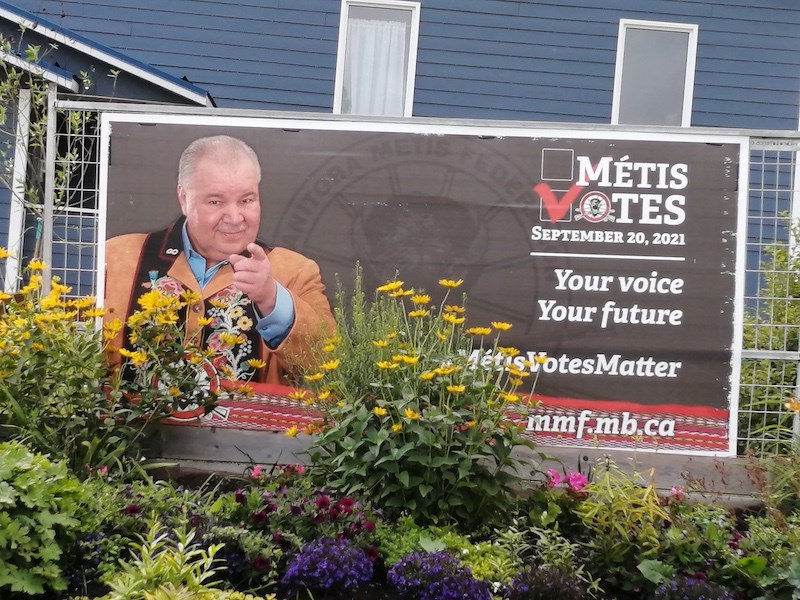The president of the Manitoba Metis Federation (MMF) says he believes a new incentive program will convince more Métis people in Manitoba to get out and vote, and he said he has no concerns that the program could be considered unethical by Canadians or by Elections Canada.
On Sept. 8 MMF announced the Get out and Vote contest, a program that they said will incentivize voter participation in the upcoming federal election, through draws that could lead to voters winning prizes like a brand new car or a PlayStation 5.
“Any Red River Métis Nation Citizen, or individual able to demonstrate that they are eligible to become a citizen, who takes a picture outside of a polling station and tags the MMF, will have their name put into a draw,” MMF said in a Sept. 8 press release.
While speaking Sept. 9, MMF President David Chartrand said he believes the program is necessary, because voter turnout is typically low among Indigenous and Métis people, and they want the candidates to understand that issues that concern these groups should be top of mind.
“If you look at how the voter system is catered in this country, it’s catered to the rich, and it’s catered to the middle and upper classes, because they create more and more rules that make it harder for those who are poor or low income to vote,” Chartrand said.
“There are so many factors for different groups in Canada for why they don’t vote, especially when you look at the Indigenous and the Métis.”
Because of that lower turnout among Indigenous and Métis citizens, Chartrand said he believes candidates often don’t take the issues of those groups as seriously as they should, because they do not believe if they do it will translate into votes.
“So if some communities have a low turnout, then the politicians can look at those numbers and say, ‘Why the hell am I wasting my time with those issues, because they don’t vote anyways, so we don’t have to worry about what their concerns are.’
“We just can’t hope for them to vote or plead with them to vote, we need to educate people that the politicians turn their attention to you if you vote, and that’s what this is all about.”
Chartrand said that he wants to make it clear the program is not about telling anyone who to vote for, and he does not believe it could be considered unethical or suspect by anyone.
“This is not about anyone voting for a specific party,” he said. “We are not telling anyone who to vote for, we are saying ‘Here is the platform of each party in regards to issues and questions that concern the Métis, so you decide what affects you directly, and what affects your family and your community.’
“And from there you can choose what party will best serve you.”
Political scientist weighs in on MMF incentives
Political scientist and University of Manitoba professor of political studies Christopher Adams said Sept. 9 that he can’t say one way or another if he thinks the incentive program is legal or ethical, and those questions all come down to whether or not it can be considered a bribe.
“The Elections Act does clearly say that it’s against the law to bribe someone to vote or to not vote, or to vote for a specific candidate,” Adams said. “So it makes it an offence to bribe someone to go to the voting station.
“So the question is, ‘How do you define a bribe?’ And is a contest a bribe if people aren’t guaranteed they will be receiving something, and if they aren’t being told who to vote for?”
The Canada Elections act states in Section 282.7 that “No person shall, during an election period, directly or indirectly, offer a bribe to influence an elector to vote or refrain from voting, or to vote or refrain from voting for a particular candidate or registered party, at the election.”
Adams added that it has to be asked if a contest like this is similar to programs set up by political organizations that offer rides to voting stations, something which is currently commonplace during elections in Canada.
“Political parties and organizations will do things in an election to encourage people to vote, including driving them to voting station so than you have to ask, ‘Is that a bribe if they are using resources to drive them to a voting station?’
“So these are the grey areas, and this is where it is a question of whether or not you are stepping over that line.”
The Winnipeg Sun reached out to Elections Canada for comment, but did not hear back before the Sept. 9 press deadline.
— Dave Baxter is a Local Journalism Initiative reporter who works out of the Winnipeg Sun. The Local Journalism Initiative is funded by the government of Canada.



